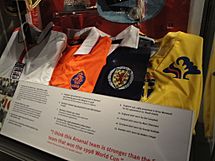Marc Overmars facts for kids
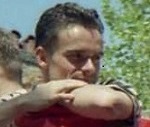
Overmars in 1998
|
|||
| Personal information | |||
|---|---|---|---|
| Full name | Marc Overmars | ||
| Date of birth | 29 March 1973 | ||
| Place of birth | Emst, Netherlands | ||
| Height | 1.73 m (5 ft 8 in) | ||
| Position(s) | Winger | ||
| Youth career | |||
| 1978–1987 | SV Epe | ||
| 1987–1990 | Go Ahead Eagles | ||
| Senior career* | |||
| Years | Team | Apps | (Gls) |
| 1990–1991 | Go Ahead Eagles | 11 | (1) |
| 1991–1992 | Willem II | 31 | (1) |
| 1992–1997 | Ajax | 136 | (36) |
| 1997–2000 | Arsenal | 100 | (25) |
| 2000–2004 | Barcelona | 97 | (15) |
| 2008–2009 | Go Ahead Eagles | 24 | (0) |
| Total | 399 | (78) | |
| International career | |||
| 1993–2004 | Netherlands | 86 | (17) |
| *Club domestic league appearances and goals | |||
Marc Overmars (born 29 March 1973) is a Dutch former professional footballer. He was known for playing as a winger, a player who runs down the sides of the field. Marc was famous for his incredible speed and great technical skills with the ball.
After his playing career, Overmars became a director of football for clubs like Ajax and Royal Antwerp F.C.. He was born in Emst, Netherlands, and loved football from a young age.
Contents
Early Life and Football Beginnings
Marc Overmars grew up on a family farm in Emst, Gelderland. He helped his grandfather harvest potatoes every year. His father, Ben, said Marc was a bit "clumsy" but always had a football with him. He would even bounce a ball on his head while coming down the stairs for breakfast!
Marc wasn't very interested in school, but he did well enough to pass some exams. As a teenager, he started weight-training, which helped him become very fast. He also said his speed came from his mother, who was quick but didn't play sports.
Marc started his football journey at a local club called SV Epe. In 1987, when he was 14, he joined the youth team of Go Ahead Eagles.
Club Career Highlights
Starting Strong at Go Ahead Eagles and Willem II
Marc Overmars quickly moved up to the first team at Go Ahead Eagles in the 1990–91 season. After that, he joined Willem II for the next season. He played 31 games for Willem II before moving to a bigger club.
Becoming a Star at Ajax
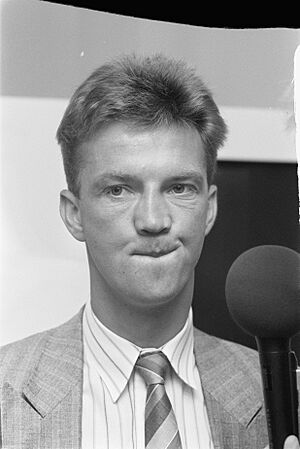
In July 1992, Marc signed with Ajax, one of the biggest clubs in the Netherlands. The manager, Louis van Gaal, really liked Marc and called him a "multi-functional player" because he could do many things on the field. Marc made his debut for Ajax in August 1992.
He quickly became a key player for Ajax. He helped them win three Eredivisie titles (the top Dutch league) between 1994 and 1996. The team also won the UEFA Champions League in 1995, which is a huge European club competition. Marc even scored against Bayern Munich in the semi-finals of that competition.
In December 1995, Marc had a serious knee injury that kept him from playing for eight months. Despite this, Ajax continued to do well, even reaching another Champions League final in 1996, though they lost on penalties.
Moving to Arsenal and Winning the Double
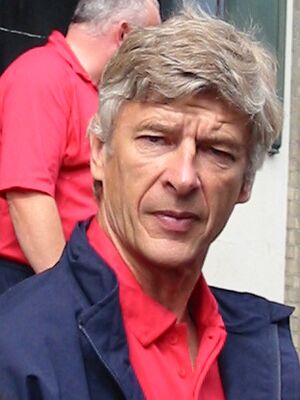
In June 1997, Marc Overmars moved to England to play for Arsenal. He signed a five-year contract. He was excited to play in England, saying he liked the faster pace of the game. Arsenal's manager, Arsène Wenger, believed Marc would be a great addition to the team.
Marc's first season at Arsenal started a bit slowly, and some people criticized his performances. However, he soon found his amazing form. He became a crucial player in Arsenal's success, helping them win both the Premier League title and the FA Cup in the 1997–98 season. This is known as winning the "Double." He scored important goals, including the winning goal against Manchester United that helped Arsenal win the league, and the first goal in the 1998 FA Cup final against Newcastle United.
Arsène Wenger praised Marc, saying he had "great mental strength" and was a "world-class player." In November 1999, Marc scored his first hat-trick (three goals in one game) for Arsenal against Middlesbrough. He played his last game for Arsenal in the 2000 UEFA Cup Final.
Time at Barcelona
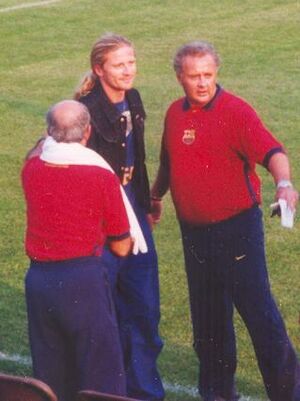
After playing for the Netherlands in UEFA Euro 2000, Marc moved to Barcelona in Spain in July 2000. This transfer made him the most expensive Dutch football player at the time. He was very happy to join such a famous club.
Marc made his debut for Barcelona in August 2000. He scored his first goal for the club in September 2000. During his time at Barcelona, the team didn't win any major trophies, and there were many changes in managers. Marc also struggled with a knee injury that kept him from playing as much as he wanted.
In May 2003, he had surgery on his right knee. Due to his ongoing knee problems, Marc announced his retirement from football in July 2004.
A Brief Return to Go Ahead Eagles
In July 2008, Marc played in a special match for a former teammate. His performance was so good that Dutch and German clubs invited him to play professionally again. In August 2008, he decided to come out of retirement and play one more season for his old club, Go Ahead Eagles. However, his knee continued to bother him, and he retired again after that season.
International Career with the Netherlands
Marc Overmars played for the Netherlands national team for 11 years. He scored a goal in his very first international game in February 1993 against Turkey.
He played in four major tournaments for his country:
In the 1994 FIFA World Cup, Marc was named the best young player of the tournament because of his excellent performances. He scored a hat-trick in a Euro 1996 qualifier against Malta in October 1995.
In the 1998 World Cup, he scored against South Korea. He also scored two goals in the UEFA Euro 2000 quarter-finals against Yugoslavia. His final game for the Netherlands was in the semi-finals of Euro 2004 against Portugal. In total, he played 86 games for his country and scored 17 goals.
Playing Style
Marc Overmars was known for being a small but incredibly effective footballer. He was often called "the archetypal winger" because of his speed, great vision, and amazing dribbling skills. He could use both feet well, which made him very hard for defenders to stop. His speed earned him nicknames like "TGV" (a fast train) and "Roadrunner."
Former teammate Emmanuel Petit said Marc's strength was being able to push the ball past defenders and then quickly run into space to deliver crosses (passes into the penalty area). He could play on both the left and right sides of the field, even though he was naturally right-footed.
Despite his great talent, Marc was also known to get injured often throughout his career.
After Playing Football
In February 2005, Marc Overmars became a part-owner of Go Ahead Eagles. He also joined the club's board to help with football-related decisions.
In 2011, he started working as a youth coach for Ajax one day a week. He left his role at Go Ahead Eagles in 2012.
Marc became the director of football at Ajax in July 2012. He resigned from this position in February 2022 due to inappropriate behavior. In March 2022, he became the director of football for Royal Antwerp F.C. in Belgium. However, this caused some sponsors to leave the club.
In January 2024, Marc Overmars was banned from world football for one year by FIFA due to his past inappropriate behavior. This ban started on November 16, 2023.
Personal Life
Marc Overmars married Chantal van Woensel in May 2013. They have two sons, Frenkie and Nick, who also play football.
He co-owns a restaurant in Epe, where he lives. His family also has a business called Overmars Vastgoed bv, which invests in buildings. With his father and brother, he runs a car restoration service called Overmars Classic Cars.
In December 2022, Marc Overmars had a serious health issue. It was later revealed that he suffered a cardiac arrest, which is a very serious heart problem. He is recovering, but his heart is currently only working at 30% efficiency.
Career Statistics
Club
| Club | Season | League | National cup | League cup | Europe | Other | Total | |||||||
|---|---|---|---|---|---|---|---|---|---|---|---|---|---|---|
| Division | Apps | Goals | Apps | Goals | Apps | Goals | Apps | Goals | Apps | Goals | Apps | Goals | ||
| Go Ahead Eagles | 1990–91 | Eerste Divisie | 11 | 1 | – | – | 11 | 1 | ||||||
| Willem II | 1991–92 | Eredivisie | 31 | 1 | 0 | 0 | – | – | – | 31 | 1 | |||
| Ajax | 1992–93 | Eredivisie | 34 | 3 | 5 | 4 | – | 8 | 1 | – | 47 | 8 | ||
| 1993–94 | Eredivisie | 34 | 12 | 4 | 0 | – | 5 | 0 | 1 | 1 | 44 | 13 | ||
| 1994–95 | Eredivisie | 28 | 8 | 3 | 0 | – | 11 | 1 | 1 | 0 | 43 | 9 | ||
| 1995–96 | Eredivisie | 15 | 11 | 0 | 0 | – | 6 | 2 | 2 | 0 | 23 | 13 | ||
| 1996–97 | Eredivisie | 25 | 2 | 1 | 0 | – | 10 | 0 | 0 | 0 | 36 | 2 | ||
| Total | 136 | 36 | 13 | 4 | 0 | 0 | 40 | 4 | 4 | 1 | 193 | 45 | ||
| Arsenal | 1997–98 | Premier League | 32 | 12 | 9 | 2 | 3 | 2 | 2 | 0 | – | 46 | 16 | |
| 1998–99 | Premier League | 37 | 6 | 6 | 3 | 1 | 0 | 4 | 1 | 1 | 1 | 49 | 11 | |
| 1999–2000 | Premier League | 31 | 7 | 1 | 1 | 1 | 0 | 14 | 5 | – | 47 | 13 | ||
| Total | 100 | 25 | 16 | 6 | 5 | 2 | 20 | 6 | 1 | 1 | 142 | 40 | ||
| Barcelona | 2000–01 | La Liga | 31 | 8 | 5 | 0 | – | 10 | 0 | – | 46 | 8 | ||
| 2001–02 | La Liga | 20 | 0 | 1 | 0 | – | 11 | 1 | – | 32 | 1 | |||
| 2002–03 | La Liga | 26 | 6 | 0 | 0 | – | 6 | 1 | – | 32 | 7 | |||
| 2003–04 | La Liga | 20 | 1 | 3 | 2 | – | 8 | 0 | – | 31 | 3 | |||
| Total | 97 | 15 | 9 | 2 | 0 | 0 | 35 | 2 | 0 | 0 | 141 | 19 | ||
| Go Ahead Eagles | 2008–09 | Eerste Divisie | 24 | 0 | 0 | 0 | – | – | – | 24 | 0 | |||
| Career total | 399 | 78 | 38 | 12 | 5 | 2 | 95 | 12 | 5 | 2 | 542 | 106 | ||
International
| National team | Year | Apps | Goals |
|---|---|---|---|
| Netherlands | 1993 | 7 | 1 |
| 1994 | 14 | 1 | |
| 1995 | 8 | 4 | |
| 1996 | 2 | 0 | |
| 1997 | 4 | 0 | |
| 1998 | 14 | 4 | |
| 1999 | 3 | 0 | |
| 2000 | 10 | 4 | |
| 2001 | 8 | 1 | |
| 2002 | 2 | 0 | |
| 2003 | 8 | 1 | |
| 2004 | 6 | 1 | |
| Total | 86 | 17 | |
- Scores and results list the Netherlands' goal tally first, score column indicates score after each Overmars goal.
| No. | Date | Venue | Opponent | Score | Result | Competition | Ref. |
|---|---|---|---|---|---|---|---|
| 1 | 24 February 1993 | Stadion Galgenwaard, Utrecht, Netherlands | 1–0 | 3–1 | 1994 FIFA World Cup qualification | ||
| 2 | 12 June 1994 | Varsity Stadium, Toronto, Canada | 2–0 | 3–0 | Friendly | ||
| 3 | 11 October 1995 | Ta'Qali Stadium, Ta'Qali, Malta | 1–0 | 4–0 | UEFA Euro 1996 qualifying | ||
| 4 | 2–0 | ||||||
| 5 | 3–0 | ||||||
| 6 | 15 November 1995 | De Kuip, Rotterdam, Netherlands | 3–0 | 3–0 | UEFA Euro 1996 qualifying | ||
| 7 | 1 June 1998 | Philips Stadion, Eindhoven, Netherlands | 1–1 | 5–1 | Friendly | ||
| 8 | 2–1 | ||||||
| 9 | 5 June 1998 | Amsterdam Arena, Amsterdam, Netherlands | 2–0 | 5–1 | Friendly | ||
| 10 | 20 June 1998 | Stade Vélodrome, Marseille, France | 2–0 | 5–0 | 1998 FIFA World Cup | ||
| 11 | 27 May 2000 | Amsterdam Arena, Amsterdam, Netherlands | 1–0 | 2–1 | Friendly | ||
| 12 | 25 June 2000 | De Kuip, Rotterdam, Netherlands | 5–0 | 6–1 | UEFA Euro 2000 | ||
| 13 | 6–0 | ||||||
| 14 | 7 October 2000 | GSP Stadium, Nicosia, Cyprus | 3–0 | 4–0 | 2002 FIFA World Cup qualification | ||
| 15 | 25 April 2001 | Philips Stadion, Eindhoven, Netherlands | 2–0 | 4–0 | 2002 FIFA World Cup qualification | ||
| 16 | 7 June 2003 | Dinamo Stadium, Minsk, Belarus | 1–0 | 2–0 | UEFA Euro 2004 qualifying | ||
| 17 | 1 June 2004 | Stade Olympique de la Pontaise, Lausanne, Switzerland | 3–0 | 3–0 | Friendly |
Honours and Awards
Ajax
- Eredivisie: 1993–94, 1994–95, 1995–96
- KNVB Cup: 1992–93
- Dutch Supercup: 1993
- UEFA Champions League: 1994–95
- Intercontinental Cup: 1995
Arsenal
- Premier League: 1997–98
- FA Cup: 1997–98
- FA Charity Shield: 1998
Individual Awards
- Dutch Football Talent of the Year: 1992
- Dutch Golden Shoe Winner: 1993
- FIFA World Cup Best Young Player: 1994
- AFC Ajax Player of the Year: 1996
See also
 In Spanish: Marc Overmars para niños
In Spanish: Marc Overmars para niños
 | James Van Der Zee |
 | Alma Thomas |
 | Ellis Wilson |
 | Margaret Taylor-Burroughs |


